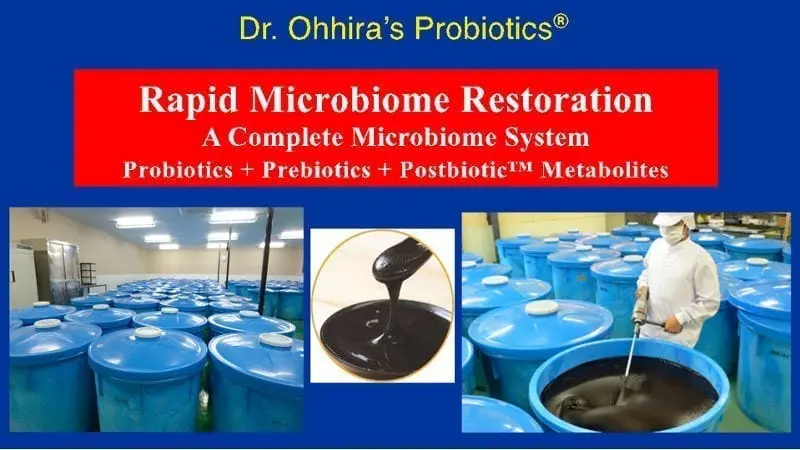The Future of Microbiome Science and Probiotic Health Discovered
By Ross Pelton, RPh, PhD, CCN
All living organisms, ranging from fungi and bacteria to plants, animals and people, ingest compounds that they use for growth and the production of energy. In all cases, an organism’s metabolic processes result in the production of compounds that are called metabolites. Many metabolites are simply excreted as non-usable waste products.
Many organisms live or exist in a symbiotic relationship, and one example is the probiotic bacteria that live in the human gastrointestinal tract. We are their lifelines. We provide them with food and a safe place to live. On the other hand, it is becoming increasingly clear that we could not live without them either. The reason humans are dependent on their bacteria is because the bacteria are essentially little chemical factories that produce a wide range of compounds or metabolites that regulate a vast amount of physical and mental/emotional health. We refer to these health-regulating compounds produced by probiotic bacteria as postbiotic metabolites (other synonymous terms appearing in the scientific literature are bacterial metabolites, microbial metabolites and fecal metabolites.
In the past, compounds excreted by organisms were frequently classified as waste products. Now scientists are discovering that many of the compounds that organisms produce are used by and required by their symbiotic hosts. In a book titled The Mind-Gut Connectioni, respected author and scientist Emeran Mayer, MD states that your bacteria use the information in their millions of genes to ferment and digest fiber-rich foods to produce hundreds of thousands of metabolites.
The New Frontier in Microbiome Science
For several decades, the primary focus of microbiome science has been the identification and naming of specific species and/or strains of bacteria. The New Frontier in microbiome science places a greater emphasis on identifying the various compounds that bacteria produce, learning what the health-regulating effects of those metabolites are and also, learning which strains of bacteria are more efficient at producing those health-regulating metabolites.
Microbiome Diversity
A critical goal related to health is to create and maintain a healthy microbiome. Numerous human clinical trials report that a more diverse microbiome is a healthier microbiome.ii iii Scientists estimate that a healthy human microbiome contains from 500 to 1,000 different species of bacteria. On the other hand, low bacterial diversity in the intestinal tract is linked to various diseases such as obesityiv and inflammatory bowel disease.v
The way to achieve and maintain a greater variety of probiotic bacteria is to consume a significant difference of fiber-rich foods. A greater diversity of dietary fiber (prebiotics) supports the growth of a greater diversity of bacteria (probiotics), which results in the production of a greater variety of postbiotic metabolites! Different strains of good bacteria digest and ferment diverse types of fibers, which results in the production of a wide range of postbiotic compounds that promote good health.
Long before science confirmed the importance of postbiotic metabolites, Dr. Iichiroh Ohhira’s research revealed that probiotics derived from a multitude of crops and fermented for 3- to 5 years resulted in the production metabolites he referred to as biogenics. These are the compounds we now call postbiotic metabolites.
Recent research has revealed that Dr. Ohhira’s Probiotics contain over 400 postbiotic metabolites. This explains why Dr. Ohhira’s Probiotics are so effective at rapidly healing intestinal problems.
Taking Probiotics: A Multi-step Process:
When an individual with intestinal dysbiosis ingests probiotic bacteria, the following multi-step process needs to occur in order to achieve benefits:
- Bacteria must safely transit through the harsh acid in the stomach and arrive safely in the small intestines.
- The bacteria then need to “find” the types prebiotic foods that contain the types of fibers they require for their metabolic processes.
- If the host/patient is not consuming a wide variety of fiber-rich foods (primarily colored vegetables & fruits), the probiotic bacteria won’t get the kind of fiber/foods they require and hence, they are not likely to thrive.
- Also, the arriving probiotic bacteria will probably be entering a very hostile environment where they have to “fight” and survive against a large population of enemy, ie. “bad” or pathological bacteria; like sending billions of soldiers to fight trillions of enemy soldiers.
- The probiotics may also be entering a highly inflamed intestinal tract where a large number of free radicals are being produced. This might be similar to firefighters entering an area with a raging forest fire, or soldiers entering into a battle where a large amount of enemy artillery is being fired at them.
- The acid/base level in the intestinal tract of people with dysbiosis can be anywhere from 10x to 100x too alkaline. Pathological bacteria thrive in an alkaline pH whereas probiotic bacteria require a slightly acidic environment. Sending probiotics into an inflamed, alkaline environment is kind of like sending an Eskimo to work in the Sahara Desert or sending a desert nomad to work in the frigid Arctic.
Directly Ingesting Postbiotic Metabolites = FAST ACTION
When postbiotic metabolites are ingested, they go to work immediately adjusting the acid/base level towards a more optimal slightly acidic pH, reducing inflammation, accelerating the growth of healthy new cells in the lining of the GI tract, and anti-microbial peptides begin killing pathological bacteria.
Dr. Ohhira’s Probiotics is the only product that delivers hundreds of postbiotic metabolites with each dose, in addition to probiotic bacteria and supportive prebiotic foods. This is why we at Essential Formulas refer to Dr. Ohhira’s as “A Complete Microbiome System,” that helps achieve Rapid Microbiome Restoration.







